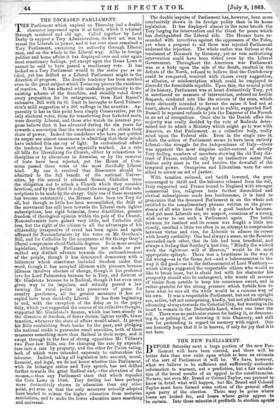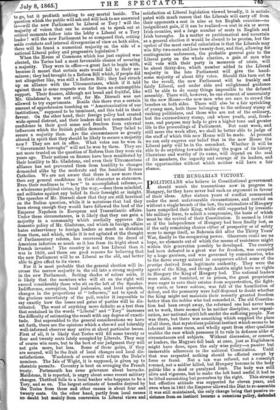THE NEW PARLIAMENT. B EFORE Saturday next a large portion of
the new Par- liament will have been elected, and there will be better data than now exist upon which to base an estimate of the sort of Parliament it will be. We have, however, what we believe to be sufficient and sufficiently authentic information to warrant, not a prediction, but a fair calcula- tion of the broad results of an appeal to the constituencies_ Noman, not even Mr. Brand or Colonel Taylor, can pretend to know in detail what will happen, but Mr. Brand and ColonaL Taylor must have formed some notion of the general effeat upon party of the election. There may be gains where losses are looked for, and losses where gains appear to. be certain. Into these minutia) it proflteth to election agents
to go, but it profiteth nothing to any mortal beside. The question which the public will ask and will look to see answered is—will the new Parliament be Liberal or Tory ? will the majority of voices that can be counted on to speak out at critical moments follow into the lobby a Liberal or a Tory leader ? will the new Parliament be so composed that, setting aside crotchets and internal divergencies of view on both sides, there will be found a numerical majority on the side of a national Liberal policy and progressive legislation ? When the House of Commons which has just expired was elected, the Tories had a most favourable chance of securing a majority. They were in office—a great fact to begin with, because it meant that certain seats would fall to their no- minees; they had brought in a Reform Bill which, if people did not altogether like, was still a Reform Bill ; they had struck up an alliance with the Ultramontanes, which if it told against them in some respects won for them no contemptible support. Their finance, although not broad and fruitful, like Mr. Gladstone's, was not evil, for Mr. Disraeli was not allowed to try experiments. Beside this there was a certain amount of apprehension touching an "Americanization of our • institutions, supposed to be imminent, and this told in their favour. On the other hand, their foreign policy had created wide-spread distrust, and their leaders did not command that confidence in their good sense and freedom from external influences which the British public demands. They failed to secure a majority then. Are the circumstances so greatly altered in spirit that they should be likely to secure a majority now ? They are not in office. What votes can be won in "Government boroughs" will not be won by them. They are not more trusted on the question of Reform than they were six years ago. Their notions on finance have been manifested by their hostility to Mr. Gladstone, and even their Ultramontane alliance has not prevented them from hostility to changes demanded alike by the moderate and the fanatical Roman Catholics. We are not aware that there is now more than then any general confidence in their character as statesmen. Even their readiness to " bow " to accomplished reforms,— a wholesome political virtue, by the way,—does them mischief, and militates against any belief in their foresight or insight. The speeches of Mr. Disraeli show that they are still heretical on the Italian question, while it is notorious that had they been strong enough they would have followed the lead of the Emperor Napoleon in European and Transatlantic affairs. Under these circumstances, is it likely that they can gain a majority in a community which cordially approves the domestic policy of Mr. Gladstone, and which in foreign affairs hates subserviency to foreign leaders as much as dictation from them, and which, while it is not agitated at the thought of Parliamentary reform, has recovered from its dread of American infection as much as it has from its fright about a French invasion? The country is not less Liberal than it was in 1859, and there are good reasons for believing that the new Parliament will be as Liberal as the old, and better able.to give effect to its views.
For it is most probable that the general election will in- crease the narrow majority in the old into a strong majority in the new Parliament. Setting shades of colour aside, it is likely that the members who will sit on the right will exceed considerably those who sit on the left of the Speaker. Indifference, corruption local jealousies, and local quarrels, changes in the proportions of "influence," not to speak of the glorious uncertainty of the poll, render it impossible to say exactly how the losses and gains of parties will be dis- tributed. The want of anything more definite as a test than that contained in the words "Liberal" and "Tory" increases the difficulty of estimating the result with any degree of exacti- tude. But superadded to the general considerations we have set forth, there are the opinions which a shrewd and tolerably well-informed observer may arrive at about particular issues. First of all, it is likely that Tories will fill some twenty or four and twenty seats lately occupied by Liberals. They may of course win more, but to the best of our judgment they will not gain more, but less. Some of these gains, if they are secured, will be the fruit of local changes and local dis- satisfactions. Woodstock of course will return the Duke's nominee. The Isle of Wight, it is supposed, is given up to obstetric pursuits. Coventry is bent on avenging the French treaty. Portsmouth has some grievance about barracks. Maidstone, it is reported, is angry about some recent military changes. Thetford falls to a local banker who happens to be a Tory, and BO on. The largest estimate of benefits derived by the Tories from these and other causes is about four and twenty seats. On the other hand, partly from local causes no. doubt but mainly from conversion to Liberal views and
satisfaction at Liberal legislation viewed broadly, it is antici.4' paled with much reason that the Liberals will carry off from their opponents a seat in nine or ten English counties—no insignificant gain, if it can be realized—a seat in six or seven Irish counties, and a large number of seats in English and Irish boroughs. In a matter so problematical and uncertain as a general election it would be absurd to be precise, but the upshot of the most careful calculation is that the Liberals may win fifty-two seats and lose twenty-four, and that, allowing for contingencies unforeseen, the probable general gain to the Liberal party on the whole election, a gain of men who will vote with their party in moments of crisis, will be about thirty-five, which number added to the Liberal majority in the late Parliament will give the hand- some majority of about fifty votes. Should this turn out to be the result, the new Parliament will be frankly and fairly Liberal, and under able and enlightened guidance will be able to do many things impossible to the defunct assembly. There will, however, be one element of uncertainty in the new House—the new men who are sure to crowd the benches on both sides. There will also be a fair sprinkling of young men, both those belonging to the ordinary stamp of sucking politicians, and those who are not of the ordinary, but the extraordinary stamp, and whose youth, zeal, fresh- ness, and purpose may help to give a higher tone and greater life to the proceedings of Parliament. But next week, and still more the week after, we shall be better able to judge of the stuff of which this new House will be made. At present we can only express our belief that in the new House the Liberal party will be in the ascendent. Whether it will be able to do anything towards making the pages of its history illustrious and worthy of its name, will depend on the zeal of its members, the sagacity and courage of its leaders, and the opportunities without which neither will have a fair chance.































 Previous page
Previous page